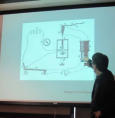





In
the
words
of
the
late
Fred
Dibnah,
“There’s
a
lot
to
be
said
for
the
olden
days
and
how
they
did
things.
They
were
better
craftsmen,
better
everything,
…
now
they’ve no respect for anything …”
Yes,
in
the
days
of
yore,
up
to
the
1980s
and
before
the
start
of
the
era
of
monetarism,
there
were
opportunities
to
add
one’s
own
perspective
on
how
things
were
done.
The
mentor
in
this
relationship
could
then
discuss
the
suggestion
and
decide
if
or
not
a
task
could
be
done
in
a
certain
way.
Apprenticeships
were
a
vehicle
for
two
way
communication,
both
participants
learning
from
one
another,
amassing
experience in their chosen vocation to carry forward into the future.
Very
few
seem
interested
in
succession
by
the
passing
down
information
through
the
generations.
The
situation
is akin to teenagers being uninterested in listening to their parents experiences.
Under New Management
In
these
days
of
large
conglomerates
it
seems
that
people
with
experience
and
local
knowledge
are
irrelevant.
The
‘craftsmen
and
women’
are
overtaken
by
new
managers
or
directors
whose
sole
purpose
seems
to
disregard
what went before.
Within
these
less
enlightened
companies,
after
very
short
time
by
drawing
on
the
one-size-fits-all
free
market
ideology,
a
new
manager
arrives
at
an
organisation
is
seemingly
able
to
assess
the
situation
and
know
what
is
best.
Many
of
these
managers
have
a
degree
often
in
some
generally
unrelated
financial
subject
and
then
attend
in-
post
courses
on
a
chosen
vocational
career.
History
shows
what
little
in-depth
knowledge
is
gained
by
attending
this
type
of
course.
It
is
said
that
if
20%
of
knowledge
is
imparted
to
the
attendees,
a
course
is
a
success.
In
my
experience, some course tutors can be so up themselves, they fail dismally at teaching others.
The
members
of
the
board,
usually
of
little
more
experience
than
the
new
manager,
go
starry-eyed
with
£
signs
and think the plans are wonderful. Little do they realise that this is window dressing.
Outsource Syndrome
The
first
thing
to
experience
from
the
new
manager
is
the
“outsource
syndrome”
Everything
is
greener
on
the
other
side
of
the
fence,
especially
when
the
third-party
salesman/consultant
says
so.
The
outsource
company
offer
a
partnership
and
to
take
existing
staff
off
the
payroll.
This
move
is
to
appease
the
organisation
and
their
clients
alike.
The
outsource
company
may
have
also
realised
the
value
of
importing
local
knowledge.
Savings
will
be
made
as
predicted
by
the
new
manager
until
the
honeymoon
with
the
third-party
is
over.
History
shows
that
costs
will
then
rise
for
the
same
original
level
of
service,
but
it’s
now
too
late
because
decades
of
experience
and
local
knowledge have already been lost.
Knowledge
Not
all
companies
are
guilty.
Some
have
woken-up
and
realised
that
as
the
baby-boomer
post
war
generation
retires, knowledge is being lost.
Take
an
engineer
called
Jack
who,
after
working
at
Squires
Gate
airport
on
the
Fylde
coast
on
Wellington
Bombers
at
Vickers
Armstrong,
moved
to
London
to
broaden
his
career.
He
worked
for
Metal
Box
company
and
invented
the
turn-button
we
see
on
shoe
polish
tins
and
take
for
granted
today.
Jack
also
worked
for
Cambridge
Instruments
working
with
the
team
who
invented
the
portable
dialysis
machine
.
He
was
instrumental
in
designing
an
apparatus
critical
to
the
project.
In
the
1960s
he
worked
for
Landis
and
Gyr
on
prototypes
of
the
note
counting
mechanism
for
today’s
ATM
machines.
Jack
had
the
ability
to
solve
problems
and,
working
with
a
team, was respected for his knowledge.
Apprenticeship Schemes
I’m
pleased
to
say
that
some
forward-thinking
organisations
are
already
seeing
the
benefit
in
passing
on
knowledge
through
apprenticeship
schemes.
There
are
many
good
apprenticeship
schemes
already
coming
on
stream,
for
example,
the
well
known
companies
include
NHS,
Taylor
Wimpey,
British
Gas,
Balfour
Beatty,
UK
Power,
Network
Rail,
IBM,
Microsoft,
Jaguar,
Halfords,
BBC,
Thomas
Cook,
DHL,
BAE
Systems
and
a
number of financial and retail organisations.
Re-applying
for
your
job
could
be
considered
a
fair
way
of
selection,
but
to
be
told
to
not
bother
at
a
pre-selection
phase
smells
of
skulduggery.
Who
is
at
fault
if
the
applicant
is
considered
unsuitable
after
a
considerable
time
in
post
doing
the
job?
In
my
opinion
it
is
not
the
applicant.
If
there
was
some
ongoing
performance
issue,
this
should
have
been
identified
and
remedied
by
the
employee’s
line
manager
years
ago.
To
destroy
a
loyal
employee’s
career
at
this
late
stage
using
a
pre-selection
process
is
corrupt and unjust.
Staff Profiling by HR
A
second
scheme
to
off-load
staff
for
small
to
medium
size
organisations
is
to
profile
the
company’s
future
needs
in
terms
of
skills
then
fit
suitable
existing
staff
into
each
skill
set.
This
is
done
through
a
review
of
performance
records
with
senior
management
and
Human
Resources
Department
armed
with
their
Croner
Guide.
Those
left
over
are
then
deemed
not
to
fit
and
are
nominated
for
redundancy.
There
is
an
‘appeals
process’
usually
taking
the
form
of
a
meeting between the outgoing employee and senior manager.
Again,
to
any
CEO
this
scheme
also
seems
fair.
However,
unbelievably
this
profiling
in
my
opinion
has
the
scope
for
even
more
corrupt
practices
than
the
first.
It
has
been
known
for
senior
managers
to
use
this
process
in
reverse
and
first
profile
their
workforce
negatively
grouping
the
staff
they
want
to
off
load.
The
remaining
staff
they
want
to
keep
are
then
grouped
into
separate
skill
sets.
Finally,
these
unscrupulous
managers
may
purposefully
create
fictitious
company
skill
sets
which
match the staff they want to keep and exclude the off-load group.
Re-train or Redundant
The
process
of
creating
the
workforce
profile
before
a
company’s
actual
long-term
skill
needs
could
be
used
to
circumvent
any
redundancy
and
diversity
legislation
problems
by
identifying
the
‘unwanted’
member
of
staff’s
background
in
advance.
In
the
absence
of
union
representation,
it
would
be
difficult
for
the
individual
to
prove
any
wrong
doing
by
a
company
in
either
of
the
above
scenarios.
Someone
who
values
their
career
may
not
even
want
to
have on record that they challenged such a situation whether the outcome was successful or not.
So,
the
fresh-faced
manager/director
reports
to
the
Board
or,
say,
in
the
case
of
local
government,
the
Councillors.
They
start
with
a
meeting
in
which
they
inevitably
give
a
Power
Point
presentation
of
figures
and
their
plans.
They
show
how
after
decades
of
steady
business
growth
they
can
improve
on
the
status
quo
and
make
savings
at
the
same
time.
They
talk
of
reorganisations
which is a euphemism for redundancies.
The
first
is
the
‘re-apply
for
your
job’
redundancy
scheme.
To
any
business
CEO
this
seems
a
fair
method
of
selection
to
ensure
the
company
has
the
required
expertise
for
the
future.
However,
what
is
very
unfair
is
the
pre-
amble
to
the
job
interviews.
Although
a
staff
member
has
been
doing
a
job
successfully
and
efficiently
for
20
or
30
years
updating
their
skills
over
time,
they
may
now
be
asked
to
go
for
an
initial
job
assessment.
Quite
often
in
this
assessment
unsuccessful
re-applicants
are
told
to
not
to
bother
applying
for
interview!
But
we
all
thought
they
were re-applying for the job they were already doing!
Most
importantly
is
keeping
up
to
date
with
best
practice
and
health
and
safety.
However,
there
are
other
spin-offs,
including:
- Communication with peers and management
- Community Involvement within the business sector
- Respectfulness of colleagues from a diversity of backgrounds
- Team building
- Pride in work contributing to promotion of brand image
Familiar?
Yes,
but
to
date
most
companies
prefer
to
not
to
invest
in
apprenticeships
and
instead
spend
enormous
sums
of
money
on
consultants
who
make
a
speciality
of
each
of
the
above
‘spin-off’
disciplines.
Not
only
do
companies
have
this
added
expense,
they
are
then
likely
to
employ
a
new
director
to
oversee
this
new
overhead
expense of the business.
Pride and respect comes from within.
For
example,
in
the
1970’s
the
British
Gas
(BG)
engineer
used
to
service
our
boiler.
It
was
the
same
person
for
several
years
who
visited,
regularly
bringing
an
apprentice
with
him.
The
engineer
knew
our
boiler
and,
if
there
was
a
problem
and
there
was
no
spare
part
on
his
van,
he
popped
down
to
the
local
depot solved the issue, then returned immediately to complete the job.
The
local
BG
depot
closed
around
the
1980s.
The
engineers
now
operate
on
a
call-out
system
by
region.
Once
they
complete
a
job,
they
log
into
the
system
to
be
told
the
address
of
the
next
job.
They
can
drive
several
miles
between
one
call
and
the
next.
In
my
experience,
if
they
do
not
have
a
spare
part
on
their
van,
they
have
to
order
it
from
a
plumbing
supply
centre
and
make a second appointment for delivery and a third for an engineer’s visit.
Not
what
one
would
call
good
customer
service,
or
putting
the
customer
first.
One
seldom
sees
the
same
engineer
from
visit
to
visit
and
only
occasionally
with an apprentice.
In
the
case
of
BG,
what
was
once
an
opportunity
for
an
apprentice
engineer
gain
local
knowledge
and
experience
involvement
with
the
community,
by
comparison
to
the
past,
seems
to
have
turned
into
a
short
visit
by
a
mobile
technician/driver.
Local
experience
and
knowledge
have
given
way
to
larger
regional
operations.
What
chance
does
an
apprentice
have in learning about their surroundings and interacting with their clients.
Pride and Respect
When
Fred
Dibnah
said,
“There’s
a
lot
to
be
said
for
the
olden
days
and
how
they
did
things
…”
I
believe
he
wasn’t
referring
to
best
practice
and
safety.
He
was
referring
to
technique,
ability
to
solve
problems,
taking
a
pride
in
what
you
do
and,
above
all,
being
respected for it.



Vickers Armstong and Welligton Bomber

Home Dialysis -1965
with Cambridge Instrument monitors







Re-applying for your Job
On
the
flip
side
of
the
coin
one
encounters
other
organisations
that
do
not
value
experience
and,
furthermore,
can have some unbelievable schemes to off-load staff.


Apart
from
the
obvious
benefits
of
apprenticeships
to
both
employee
and
company
whilst
‘earning
and
learning’
there
are
also
hidden
benefits
over
classroom
courses alone.


The Days of Yore
















